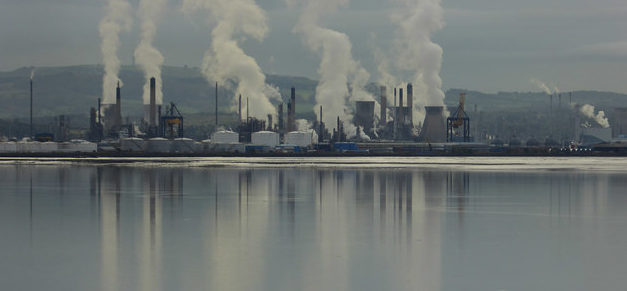The Grangemouth petrochemical giant, Ineos, is facing a legal challenge to its bid to sue the Scottish Government for multi-million pound damages for banning fracking.
An environmental group has won an unprecedented right to intervene in a court case, due to begin this week, in support of the government ban. The Court of Session in Edinburgh has given Friends of the Earth Scotland permission to make a formal submission in the “public interest”.
The group will be arguing that the fracking ban is lawful, and essential if Scotland’s is to meet its legally-binding targets to cut climate pollution. Ineos will maintain that the ban is a “misuse of ministerial power” and that it is due substantial compensation from taxpayers.
Lawyers say this is the first time that the Court of Session has permitted a public interest intervention on environmental grounds. An initial procedural hearing is scheduled on 1 May, with the substantive case due to start on 8 May.
Ineos has licences from the UK government to frack for underground shale gas across large parts of the central belt around Grangemouth. But its plans were stymied in October 2017 when the Scottish Government converted its 32-month moratorium on fracking into an indefinite ban.
Ineos announced in January 2018 that, along with Aberdeen oil and gas firm, ReachCSG, it was taking Scottish ministers to court alleging “very serious errors” in the decision-making process. It was also claiming “appropriate financial compensation”.
The Ferret understands that the company’s claim for damages, which has not been made public, could amount to hundreds of millions of pounds. Internationally, Ineos has an annual turnover of over £40 billion.
Friends of the Earth Scotland wants to ensure that the court hears arguments about climate change. “Our intervention argues that the Scottish Government is required to ban fracking so as to urgently cut greenhouse gas emissions from fossil fuels, in line with legally binding climate targets,” said the group’s head of campaigns, Mary Church.
“We are confident that the process to ban fracking was robust and fair, and we hope that the courts will find against Ineos. A two-year process looked at mountains of scientific evidence that spoke of the risks of the unconventional oil and gas industry to our environment, climate and people’s health.”
She added: “There is overwhelming support for the ban from communities on the frontline of this industry, people the length and breadth of Scotland, and almost all the parties at Holyrood.”
Scottish law firm, Balfour+Manson, which is representing Friends of the Earth Scotland, said it was delighted to be involved. “Over 60,000 people engaged in the consultation on fracking before ministers implemented the ban, with 99 per cent opposed to the industry, demonstrating the tremendous importance of this case,” said the firm’s partner, Sindi Mules.
London law firm, Leigh Day, was similarly pleased to be helping. “As far as we are aware, this is the first intervention in the Court of Session on environmental issues and one of only a handful to have been approved under the new judicial review rules,” said solicitor Carol Day.
“Friends of the Earth Scotland has submitted robust evidence on the environmental and health impacts implications of fracking. We hope the court will take these points on board during the course of the hearing.”
Ineos pointed out that fracked gas could help keep homes warm and boost the economy. “Ineos, Reach and other operators have invested significantly in unconventional development over the years, against a supportive regulatory and planning backdrop,” said a company spokesperson.
“If Scotland wants to continue to be considered as a serious place to do business, then it cannot simply remove the policy support that attracted that investment in the first place without proper procedures being followed and without the offer of appropriate financial compensation.
“In the light of these failings, Ineos has been left with no option other than to raise this legal challenge.”
The Scottish Government declined to comment. “Out of respect for the integrity of the judicial review process, it would be inappropriate to comment on the case put forward by any of the other parties during an on-going litigation,” said a spokesperson.
Photo thanks to Chris Allen, cc-by-sa/2.0. A version of this story was published in the Sunday Herald on 29 April 2018.














